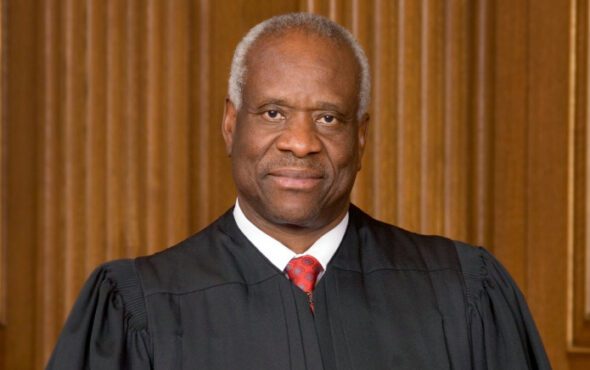
Justice Clarence Thomas has called for the Supreme Court to take aim at various other constitutional rights such as contraception, same-sex relationships and same-sex marriage.
On Friday (24 June), the Court officially overturned the landmark 1973 Roe v. Wade ruling that legalised abortion nationwide, which will essentially pave the way for half of the country to restrict or completely ban the practice.
The Supreme Court wrote in a document: “The Constitution does not confer a right to abortion; Roe and Casey are overruled; and the authority to regulate abortion is returned to the people and their elected representatives.”
Sarah Kate Ellis, CEO and GLAAD president, described the decision to overturn Roe v. Wade as “distressing”.
“Americans are losing protected access to abortion, a constitutional right they have valued for nearly 50 years, and other rights to personal liberty are at risk too,” she said.
“The anti-abortion playbook and the anti-LGBTQ playbook are one and the same. Both are about denying control over our bodies and making it more dangerous for us to live as we are.
“Both divide our country into free and less free, the opposite of what the United States should be. Our bodies, healthcare and our future belong to us, not to a meddling politician or extremist Supreme Court justices, and we will fight back.”
Ellis concluded: “So what next? We have no choice but to continue pushing for a safer and more equitable future for us all. We can build a future where our bodies, our families, and our lives are safe and celebrated.”
Following the highly controversial ruling, Justice Thomas wrote that the Supreme Court should “reconsider” various landmark decisions such as the right to contraception, same-sex relationships and same-sex marriage.
“In future cases, we should reconsider all of this Court’s substantive due process precedents, including Griswold, Lawrence, and Obergefell,” said the conservative associate justice.
In a solo concurring opinion, Thomas says the court should reconsider rulings that protect contraception, same-sex relationships, and same-sex marriage. pic.twitter.com/zcQNko6NVR
— Matt Ford (@fordm) June 24, 2022
Griswold v. Connecticut, established in 1965, protected the right of marital privacy against government restrictions on contraception.
In 2003, the Supreme Court ruled in Lawrence v. Texas that a Texas state law criminalising intimate sexual conduct between two consenting adults of the same sex was unconstitutional.
The court’s decision in 2015 in Obergefell v. Hodges legalised same-sex marriage in all 50 states, Washington, D.C and all of the United States’ territories.
Thomas, the longest-serving member of the high court, added: “Because any substantive due process decision is ‘demonstrably erroneous’ … we have a duty to ‘correct the error’ established in those precedents.”
Jim Obergefell, whose Ohio lawsuit led to SCOTUS legalising same-sex marriage, previously told The Independent that “he was terrified and people should be terrified” of the Supreme Court reviewing other landmark cases.
“This is a signal to people who are opposed to marriage equality, who are opposed to LGBT+ equality, who are opposed to progress, giving them actual words that they can use in a lawsuit to challenge something,” he said.
“And it’s a signal to judges in state and federal courts that if cases come before you using this argument, the Supreme Court might be on your side.”



